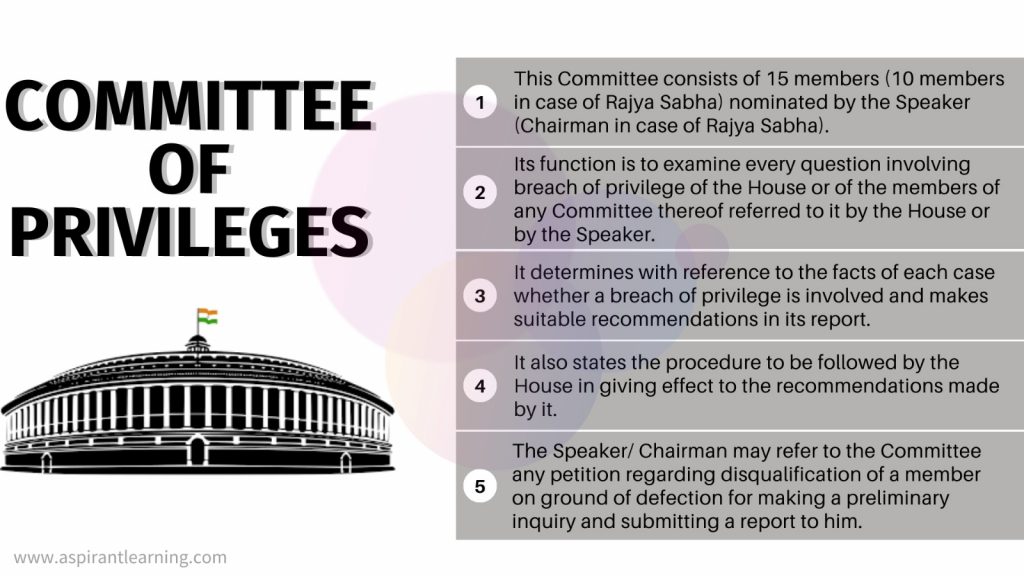News Highlights:
- Privilege motion: Recently, a breach of privilege motion was moved against senior BJP MLA and Deputy Leader of the Opposition Rajendra Rathore in the Rajasthan Assembly.
- Speaker C.P. Joshi announced that a decision on the motion would be taken shortly.
The story so far:
- The matter pertained to the resignation of 81 rulings Congress MLAs on September 25, 2022.
- Mr Rathore had filed a public interest litigation in the Rajasthan High Court seeking direction to the Assembly Speaker to decide on the resignations.
- The Assembly Secretary has since informed the court that all the 81 MLAs had appeared before the Speaker to withdraw their papers and their resignations were ‘not voluntary’.
- Rathore had approached the High Court through PIL, although the matter is under consideration by the Speaker. The Speaker had not decided on the resignations.
- This amounts to a breach of the privilege of the Assembly.
Privileges Of State Legislature:
- Constitutional Provisions:
- State Privileges (Art 194) are special rights, immunities, and exemptions enjoyed by the members of the two houses of Parliament and their committees.
- These rights are also given to those individuals who speak and participate in any committee of the Parliament, which includes the Attorney General of India and the Union Ministers.
- The President, who is an integral part of the parliament, does not enjoy these
- Powers, privileges and immunities of each House of Parliament, its Members and Committees shall be such as may be defined by Parliament by law in time.
- Till such powers, privileges and immunities are defined by Parliament, they shall be the same as that enjoyed by the House of Commons on 26th January 1950.
Parliamentary Privilege:
- Term privilege:
- The term ‘privilege’ means certain rights and immunities enjoyed by each House of Parliament and its Committees collectively and by the members of each House individually, without which they cannot discharge their functions efficiently and effectively.
- Objective:
- The objective of parliamentary privilege is to safeguard Parliament’s freedom, authority and dignity.
- They are available to individual members of the House to perform its functions freely without any delay.
- Limitations:
- Privileges of Parliament do not place a member of Parliament on a footing different from that of an ordinary citizen in the matter of the application of laws unless there are good and sufficient reasons in the interest of Parliament itself to do so.
- Some important privileges:
- Freedom of speech in Parliament,
- Immunity to a member from any proceedings in any court in respect of anything said or any vote was given by her/him in Parliament or any committee thereof,
- Immunity to a person from proceedings in any court in respect of the publication by or under the authority of either House of Parliament of any report, paper, votes or proceedings, prohibition on the courts to inquire into proceedings of Parliament and
- Freedom from the arrest of members in civil cases during the continuance of the session of the House and forty days before its commencement and forty days after its conclusion.
Breach of Privilege Motion:
- What constitutes a breach of privilege:
- While the Constitution grants MPs and legislators specific rights and powers to preserve the Houses’ dignity and authority, these powers and privileges are not codified.
- As a result, there are no clear, well-publicized guidelines for determining what constitutes a breach of privilege and the appropriate punishment.
- Any act that obstructs or impedes either House of the state legislature in carrying out its functions, or that obstructs or impedes any Member or Officer of such House in carrying out his duties, or that has the potential, directly or indirectly, to produce such results, is considered a breach of privilege.
- It is a breach of privilege and contempt to print or publish libel reflecting on the character or proceedings of the House or its Committees or on any member of the House for or relating to his character or conduct as a legislator.
- The procedure followed on the alleged breach:
- A Privileges Committee, chaired by the Speaker of the Legislative Assembly or the Chairman of the Legislative Council, comprises 15 Assembly members and 11 Council members.
- The members of the quasi-judicial committee are chosen based on the strength of the parties in the Houses.
- The Speaker or Chairman initially decides the motions.
- If the privilege and contempt are proven prima facie, the Speaker or Chairman will refer the matter to the Privileges Committee by the proper procedure.
- Currently, neither House of the state legislature has a Privileges Committee.
- The Committee will seek an explanation from all the concerned, conduct an inquiry and make a recommendation based on the findings to the state legislature for its consideration.

Conclusion:
- Members of the state legislature are granted privileges in order for the parliament to work smoothly.
- If privileges are not granted in accordance with fundamental rights, the basic core of democracy for the preservation of citizens’ rights will be lost.
- It is the parliament’s responsibility not to infringe on any other constitutionally protected rights.
Pic Courtesy: Freepik
Content Source: The Hindu



